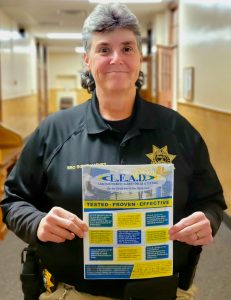BCS enacts LEAD program

“Tested. Proven. Effective.” Sgt. Tracey Harvey holds a flyer explaining some of the benefits of the Law Enforcement Against Drugs (LEAD) program coming to some schools in January.
By ZOË WATKINS
zwatkins@bedfordcountypost.com
In January, Bedford County Schools plan to establish the LEAD program (Law Enforcement Against Drugs) at three schools, including Liberty, Cascade, and Community Elementary.
The school resource officers at these three schools have been trained to teach the program, but the school plans to plant this program in more elementary schools in the upcoming year.
The main target for this program is vaping, according to Officer Tracey Harvey, SRO Sergeant in Residence at Community High.
“Over the past several years, there’s been a growing number where the kids are using vapes,” said Harvey, who’s been an SRO for 23 years.
She said they’ve had kids vaping as early as 4th grade, and the usage has increased just this year.
One reason why they’ve grown among the student population is because they’re easy to conceal. Often, many vapes resemble computer USB drives or even pens. Harvey said a lot of kids are caught with them on the bus.
Though they don’t know all the long-term effects of vaping yet, there are several known negative side-effects, especially affecting the respiratory system.
According to Harvey, about three years ago at Community High, a student had to be rushed to the emergency room for “popcorn lung.” This is when airways in the lungs become inflamed after breathing in a diacetyl, a food additive used to simulate flavors, according to Johns Hopkins Medicine. These are common in vapes that use additives to simulate fruit or dessert flavors.
Outside of flavors and nicotine, vapes can also be used to inhale THC.
When asked if vaping leads to further drug use, Harvey said because THC vapes are so widely available kids are already starting off with drug use.
“They can even order them online,” said Harvey.
WebMD defines THC as the “main psychoactive ingredient in the cannabis plant. It’s what makes you feel ‘high’ when you smoke marijuana or eat an edible.” THC products are considered schedule 1 controlled substances by the U.S. Drug Enforcement Agency (DEA).
Kind of how anti-smoking campaigns have worked over the decades, they hope to push young kids in the direction of saying ‘no’ to vaping.
“They don’t have it in their face every day saying, ‘Hey, you shouldn’t do this because of these effects,” said Harvey.
But the LEAD program does more than just talk about drugs; it also talks about bullying, self-esteem, conflict resolution, and peer-pressure.
According to Harvey, they wanted to equip 5th graders with knowledge of how to handle these situations before entering middle school.
“The kids want to be popular with the older kids, so they’ll hold these products for them and they’ll try it with them because they want to make an impression,” said Harvey. “This program covers that by talking about ways to say ‘no,’ ways to avoid peer-pressure.”
It is especially important to include law enforcement at the helm of the program.
“That way we build a rapport and start building the bridge back for kids to see law enforcement in a different perspective, understanding that they’re not just out here to arrest people and that they’re not picking on people — that they’re not the ‘bad guys,’” said Harvey. “We are there to help them and we want them to be healthy and succeed in life.”
The 10-week program will include homework assignments as well as activities, such as writing skits and presentations.
Harvey said parents can support the program by helping their kids with the homework and taking the assignments seriously.
“It’s supposed to help the parents get involved to know what their kids are doing. You can support your child by reinforcing the messages,” said Harvey.
The program is similar to the DARE program (Drug Abuse Resistance Education). DARE stopped being funded in BCS when SROs were implemented in every school.
“We were told for us to come up with our own curriculum and go into the schools and teach in the classrooms. When we first started as SROs, it was something we could do,” explained Harvey. But as time has progressed, it became more difficult for SROs to find the time in a teacher’s packed curriculum.
LEAD’s curriculum helps go along with a lot of what instructors teach, including health and physical education.
“With their curriculum, they’ve got to teach so much. So it’s really hard to get in the classrooms and make that time unless the curriculum follows along,” said Harvey. Plus, SROs need to be available as much as possible.
“I love being around the kids and seeing them successful,” said Harvey.





![For-Tips-and-Ideas-Phone-300x250-Bedford-County-Post[1]](https://www.bedfordcountypost.com/wp-content/uploads/2023/09/For-Tips-and-Ideas-Phone-300x250-Bedford-County-Post1-300x250.jpg)
![Subscribe-Now-300x250-Bedford-County-Post[1]](https://www.bedfordcountypost.com/wp-content/uploads/2023/09/Subscribe-Now-300x250-Bedford-County-Post1-300x250.jpg)
